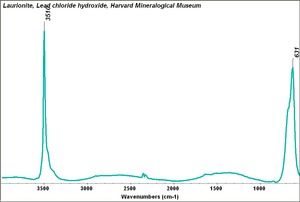Difference between revisions of "Laurionite"
Jump to navigation
Jump to search
| (One intermediate revision by the same user not shown) | |||
| Line 2: | Line 2: | ||
A rare halide mineral composed of lead chloride hydroxide. Laurionite crystals occurs as colorless, transparent, striated prisms. They were first identified in ancient lead slags at Laurium, Greece. Deposits are also found in Wheal Rose, England. Laurionite forms when saline containing water comes in contact with lead. | A rare halide mineral composed of lead chloride hydroxide. Laurionite crystals occurs as colorless, transparent, striated prisms. They were first identified in ancient lead slags at Laurium, Greece. Deposits are also found in Wheal Rose, England. Laurionite forms when saline containing water comes in contact with lead. | ||
| − | + | [[[SliderGallery rightalign|Laurionite.TIF~FTIR (MFA)]]] | |
== Synonyms and Related Terms == | == Synonyms and Related Terms == | ||
lead chloride hydroxide | lead chloride hydroxide | ||
| − | + | ==Physical and Chemical Properties== | |
| − | |||
| − | == | ||
| − | Fine, colorless, orthorhombic, tabular crystals. Fracture= uneven Luster = pearly to adamantine Streak = white | + | * Fine, colorless, orthorhombic, tabular crystals. |
| + | * Fracture= uneven | ||
| + | * Luster = pearly to adamantine | ||
| + | * Streak = white | ||
{| class="wikitable" | {| class="wikitable" | ||
| Line 22: | Line 23: | ||
|- | |- | ||
! scope="row"| Density | ! scope="row"| Density | ||
| − | | 6.24 | + | | 6.24 g/ml |
|- | |- | ||
! scope="row"| Molecular Weight | ! scope="row"| Molecular Weight | ||
| Line 31: | Line 32: | ||
|} | |} | ||
| − | == | + | ==Resources and Citations== |
| − | |||
| − | |||
| − | |||
| − | |||
| − | |||
| − | |||
| − | |||
| − | |||
| − | |||
| − | |||
| − | |||
| − | |||
| − | |||
| − | |||
| − | |||
| − | |||
| − | * | + | * Mindat at http://www.mindat.org/min-2343.html (accessed Nov 19, 2008) Hardness=3.0-3.5 |
| − | Hardness= | + | * Web Minerals at http://www.webmineral.com/data/Laurionite.shtml (accessed Nov 19, 2008) Hardness=2.5-3.0 |
[[Category:Materials database]] | [[Category:Materials database]] | ||
Latest revision as of 09:40, 16 September 2022
Description
A rare halide mineral composed of lead chloride hydroxide. Laurionite crystals occurs as colorless, transparent, striated prisms. They were first identified in ancient lead slags at Laurium, Greece. Deposits are also found in Wheal Rose, England. Laurionite forms when saline containing water comes in contact with lead.
Synonyms and Related Terms
lead chloride hydroxide
Physical and Chemical Properties
- Fine, colorless, orthorhombic, tabular crystals.
- Fracture= uneven
- Luster = pearly to adamantine
- Streak = white
| Composition | PbClOH |
|---|---|
| Mohs Hardness | 2.5-3.5 |
| Density | 6.24 g/ml |
| Molecular Weight | 259.66 |
| Refractive Index | 2.077; 2.116; 2.158 |
Resources and Citations
- Mindat at http://www.mindat.org/min-2343.html (accessed Nov 19, 2008) Hardness=3.0-3.5
- Web Minerals at http://www.webmineral.com/data/Laurionite.shtml (accessed Nov 19, 2008) Hardness=2.5-3.0
